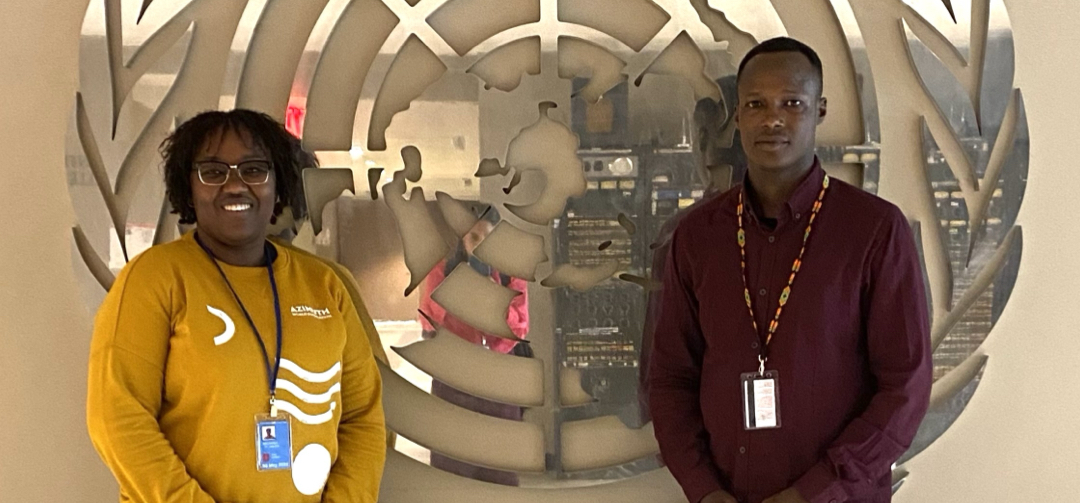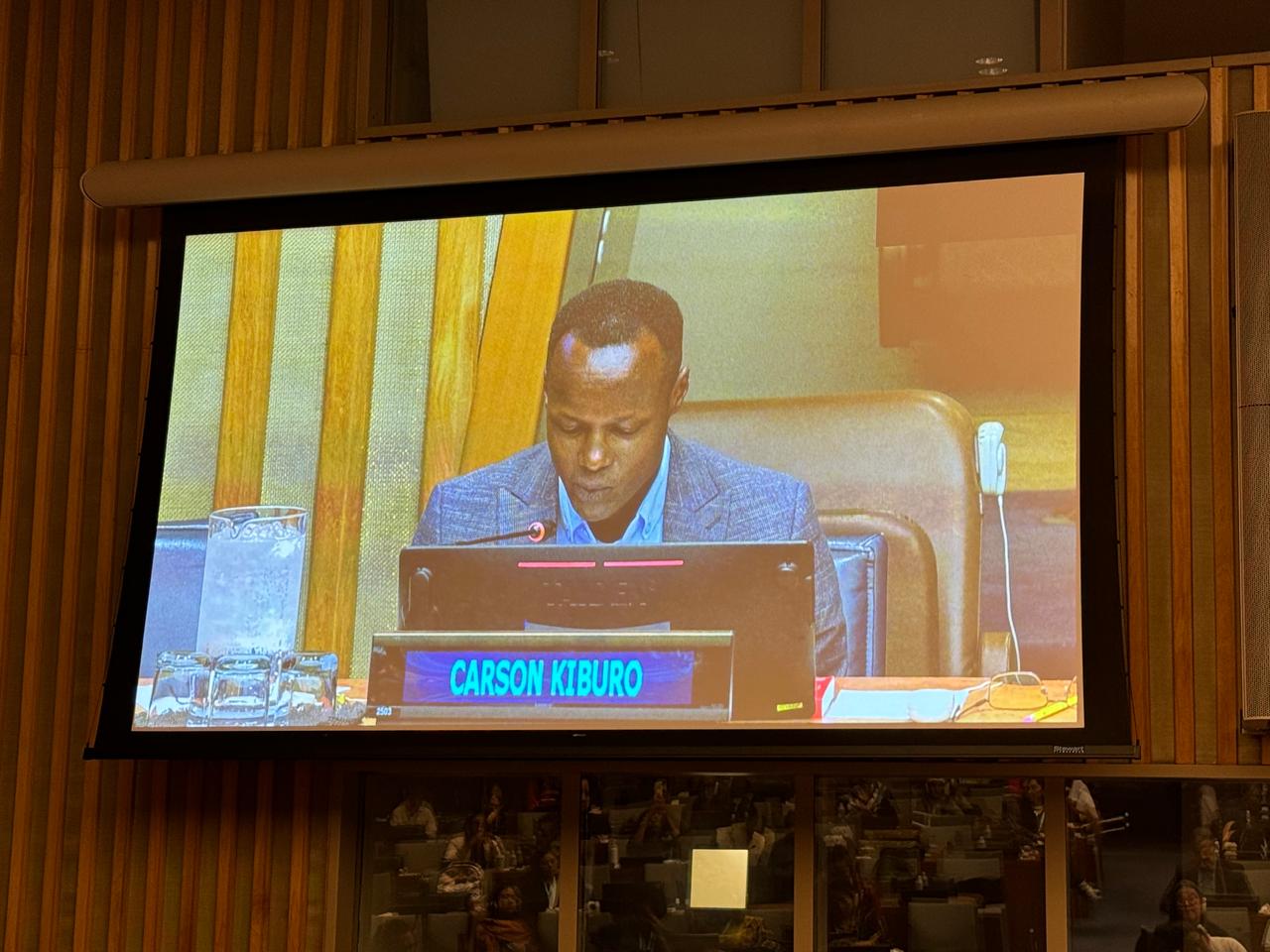Azimuth and Partners at the UN Permanent Forum on Indigenous Issues 2025

Jacque Macharia, Azimuth’s Africa Program Officer, represented Azimuth in the crucial gathering, which took place in April 2025, at the United Nations headquarters in New York.
This year’s United Nations Permanent Forum on Indigenous Issues (UNPFII) centered on “Implementing the United Nations Declaration on the Rights of Indigenous Peoples within United Nations Member States and the United Nations system, including identifying good practices and addressing challenges”, marking an important moment to assess progress and identify pathways forward for Indigenous rights globally.
Through our ongoing partnership with Jamii Asilia Centre, we supported Carson Kiburo, Executive Director of this Endorois Indigenous youth-led organization, to attend and participate in UNPFII 2025. Carson’s presence at the Forum exemplifies the vital importance of Indigenous youth voices in global conversations about self-determination and rights implementation.
View this post on Instagram
One of the most meaningful aspects of Carson’s participation was his invitation to co-panel with respected Indigenous elders and UNDRIP experts, including Kenneth Deer, Professor Elsa Stamatopoulou, Dr. Binota, and Myrna Cunningham.
This intergenerational dialogue embodied the spirit of knowledge transfer that lies at the heart of Indigenous movements.
“Sitting there, it was magical. It seemed like it wasn’t real, being with those elders. And being invited to that space to share my experiences on intergenerational knowledge, and how my participation has been, the gains that we realised when I was a leader at the Youth Caucus, was beautiful.” – Carson Kiburo

Carson’s participation extended beyond panels to engaging with complex questions about Bio-Cultural Rights Frameworks and Free, Prior and Informed Consent (FPIC) – areas directly relevant to his legal studies and community work.
He explored fundamental questions about whether these frameworks truly serve Indigenous communities or represent external impositions.

WhatsApp Image 2025-04-24 at 22.09.13
Carson interviewed by Cultural Survival’s Edson Krenak
The Forum’s discussions underscored persistent challenges facing Indigenous communities worldwide. Indigenous Peoples often face systemic discrimination, exclusion from decision-making and threats to their lands and territories due to development without free, prior and informed consent, extractive industries, armed conflict and climate change.
Despite progress in some areas, the Forum emphasized that free, prior and informed consent is a cornerstone of the Declaration and is frequently disregarded, exacerbating conflict and marginalization.
The Forum’s call for stronger political commitment, capacity-building and genuine partnerships with Indigenous Peoples resonates with Azimuth’s approach to supporting Indigenous-led organizations like Jamii Asilia Centre.
Carson’s powerful presence at UNPFII 2025 reminds us that meaningful change emerges when Indigenous youth have platforms to share their knowledge, advocate for their communities, and shape the conversations that affect their futures.
Azimuth and Partners at the UN Permanent Forum on Indigenous Issues 2025

Jacque Macharia, Azimuth’s Africa Program Officer, represented Azimuth in the crucial gathering, which took place in April 2025, at the United Nations headquarters in New York.
This year’s United Nations Permanent Forum on Indigenous Issues (UNPFII) centered on “Implementing the United Nations Declaration on the Rights of Indigenous Peoples within United Nations Member States and the United Nations system, including identifying good practices and addressing challenges”, marking an important moment to assess progress and identify pathways forward for Indigenous rights globally.
Through our ongoing partnership with Jamii Asilia Centre, we supported Carson Kiburo, Executive Director of this Endorois Indigenous youth-led organization, to attend and participate in UNPFII 2025. Carson’s presence at the Forum exemplifies the vital importance of Indigenous youth voices in global conversations about self-determination and rights implementation.
View this post on Instagram
One of the most meaningful aspects of Carson’s participation was his invitation to co-panel with respected Indigenous elders and UNDRIP experts, including Kenneth Deer, Professor Elsa Stamatopoulou, Dr. Binota, and Myrna Cunningham.
This intergenerational dialogue embodied the spirit of knowledge transfer that lies at the heart of Indigenous movements.
“Sitting there, it was magical. It seemed like it wasn’t real, being with those elders. And being invited to that space to share my experiences on intergenerational knowledge, and how my participation has been, the gains that we realised when I was a leader at the Youth Caucus, was beautiful.” – Carson Kiburo

Carson’s participation extended beyond panels to engaging with complex questions about Bio-Cultural Rights Frameworks and Free, Prior and Informed Consent (FPIC) – areas directly relevant to his legal studies and community work.
He explored fundamental questions about whether these frameworks truly serve Indigenous communities or represent external impositions.

WhatsApp Image 2025-04-24 at 22.09.13
Carson interviewed by Cultural Survival’s Edson Krenak
The Forum’s discussions underscored persistent challenges facing Indigenous communities worldwide. Indigenous Peoples often face systemic discrimination, exclusion from decision-making and threats to their lands and territories due to development without free, prior and informed consent, extractive industries, armed conflict and climate change.
Despite progress in some areas, the Forum emphasized that free, prior and informed consent is a cornerstone of the Declaration and is frequently disregarded, exacerbating conflict and marginalization.
The Forum’s call for stronger political commitment, capacity-building and genuine partnerships with Indigenous Peoples resonates with Azimuth’s approach to supporting Indigenous-led organizations like Jamii Asilia Centre.
Carson’s powerful presence at UNPFII 2025 reminds us that meaningful change emerges when Indigenous youth have platforms to share their knowledge, advocate for their communities, and shape the conversations that affect their futures.





